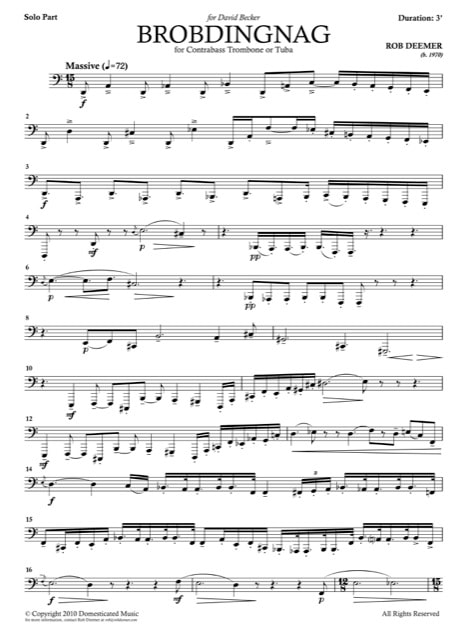- Store
- >
- Instruments
- >
- Brass
- >
- Trombone
- >
- Brobdingnag (Tba. version)
Brobdingnag (Tba. version)
SKU:
RD-002Tba-S
$24.00
$24.00
Unavailable
per item
Composer: Rob Deemer
Duration: 3:00
Scoring: contrabass trombone (or Tuba)
Materials: score (9.5 x 13)
Duration: 3:00
Scoring: contrabass trombone (or Tuba)
Materials: score (9.5 x 13)
Program Note
There are few instruments that cause double-takes as much as a contrabass trombone; at first glance, it looks very much like a normal trombone...but so much bigger. Having a history that reaches back into the 16th century and matures into the first true Bb contrabass in the mid-19th century, it has been used by composers such as Wagner, Verdi, Puccini, and Schoenberg. It is not commonly found today, by any means, but there are bass trombonists worldwide who have become enthusiasts of this special instrument.
One of those performers, David Becker of Chicago, asked me to write a short work for him to premiere at the Eastern Trombone Workshop at Fort Myers, VA in 2010. I decided to base the work on the story of Gulliver’s Travels by Jonathan Swift - specifically Part II which brought Gulliver to the land of Brobdingnag inhabited by giant-sized people and animals. The work itself is a brief exploration of the power and versatility of the contrabass instrument with emphasis on the very lowest octave.
Even though the work was originally composed for the contrabass trombone, a number of performers on other contrabass instruments have enjoyed performing it, so in addition to the contrabass trombone, this version has been performed tuba and transposed versions have been created for contrabassoon and contrabass.
— Rob Deemer
One of those performers, David Becker of Chicago, asked me to write a short work for him to premiere at the Eastern Trombone Workshop at Fort Myers, VA in 2010. I decided to base the work on the story of Gulliver’s Travels by Jonathan Swift - specifically Part II which brought Gulliver to the land of Brobdingnag inhabited by giant-sized people and animals. The work itself is a brief exploration of the power and versatility of the contrabass instrument with emphasis on the very lowest octave.
Even though the work was originally composed for the contrabass trombone, a number of performers on other contrabass instruments have enjoyed performing it, so in addition to the contrabass trombone, this version has been performed tuba and transposed versions have been created for contrabassoon and contrabass.
— Rob Deemer
Reproduction Notice:
This program note may be freely reproduced in concert programs, provided that proper credit is given to the composer.
This program note may be freely reproduced in concert programs, provided that proper credit is given to the composer.

